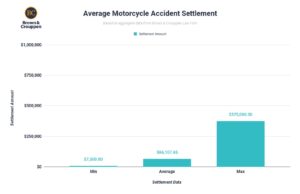Factors That Affect the Length of Motorcycle Accident Lawsuits
1. Negligence and Liability
If negligence and liability are undisputed, the chances are greater that a case will settle quickly. Cases are only drawn out for long periods of time when the parties cannot agree and more evidence is necessary to prove your case.
In a motorcycle accident case, in order to hold another party liable for the motorcyclist’s injuries, a lawyer must be able to prove the other party was negligent and that negligence caused the motorcyclist’s injuries. Negligence is legally defined as “the failure to exercise the care that a reasonably prudent person would exercise in like circumstances.” In plain terms, it means asking, “Did the driver act reasonably under these circumstances?” and “Did the motorcyclist act reasonably under these circumstances?” What is considered reasonable and what qualifies as negligence for a specific accident depends on the circumstances of the case. For example, many motorcycle crashes happen because drivers in their cars don’t notice motorcyclists. A driver following too closely behind a motorcyclist or not noticing the motorcyclist because they were distracted, inattentive, or speeding would obviously be unreasonable behavior.
One situation that frequently arises in motorcycle accidents and significantly influences negligence and liability considerations is the motorcyclist’s decision to wear or not wear a helmet. If you operate a motorcycle without a helmet, an insurance company or a jury (if your case proceeds to trial) may perceive your decision to ride without a helmet negatively. Even if the laws of your state do not require motorcyclists to wear a helmet, that doesn’t mean an insurance adjuster or a jury is not allowed to have a negative opinion about it. Some might consider it reckless to consciously disregard this risk to your own safety. Others might consider how a helmet could have prevented your injuries or reduced their severity. Additionally, even if the other party is at fault for the accident, the at-fault driver will highly emphasize your decision to forego wearing a helmet in order to avoid liability for the accident altogether, thus prolonging your personal injury claim.
In some cases, it’s easy to prove who’s at fault in a motorcycle accident. When there is no doubt about who caused the collision, or the other party admits liability (meaning they take full responsibility for the accident), the claim is more likely to settle quickly because there is nothing to argue about. However, in an accident where the parties cannot agree on whose fault it is, or both parties contributed to the accident in some way, resolving the claim will take more time. More evidence like an accident reconstruction report, witness interviews, or consulting with experts might be necessary to prove your case.
If the parties cannot reach an agreement in a timely manner, a personal injury claim can turn into a lawsuit which may result in a trial. Insurance companies know that trials are expensive and extremely time-consuming. It can be years after an accident occurs before the case is argued before a jury in a courtroom. Insurance adjusters highly consider this when deciding whether or not to settle a claim quickly.

Use our guide to understand key legal considerations and what to do after a motorcycle accident.
2. Severity of Injuries
How long it takes for a motorcycle accident settlement to pay out is highly influenced by the seriousness of the injuries the motorcyclist suffered as a result of the accident. If injuries are life-altering, chronic, or permanent, the case is more likely to settle quickly. For example, if a motorcyclist sustains severe spinal cord trauma, this can result in an expensive hospital stay, chronic pain, invasive surgeries, and ongoing physical therapy and pain management for the rest of their life. Where it is obvious that the motorcyclist will require extensive medical treatment for the rest of their life, and the accident was not their fault, an insurance company is more likely to settle the case sooner rather than later. Additionally, if a motorcycle accident is so life-threatening that the injured party requires emergent hospitalization and incurs a medical bill close to or well in excess of available insurance policy limits, the likelihood of resolving the case quickly is greater.
On the other hand, if the injuries are minor, resolving the case might take a little longer. With injuries that can be resolved with a small procedure or only a few months of treatment, your lawyer will likely want to wait until you have finished your medical treatment before making a claim for your injuries. This is to ensure all of your medical expenses are included and considered when negotiating a settlement.
No matter the extent of injuries, it’s important to understand what to do after a motorcycle accident to properly document any associated injuries.
3. Insurance Settlement vs. Lawsuit
If settlement negotiations are finalized, the parties enter into a settlement agreement, which prevents any further legal action regarding the case. As mentioned above, cases are only drawn out for long periods of time when the parties cannot agree and more evidence is necessary to prove your case. If the parties cannot reach an agreement, a personal injury lawsuit may be filed in court to pursue compensation. Although most motorcycle accident cases are settled out of court, a trial may be needed if an insurance company does not respond or refuses the payout of a fair settlement. An experienced motorcycle accident attorney will determine whether filing a lawsuit is necessary.
How a Motorcycle Accident Lawyer Can Help
Contacting a motorcycle accident attorney in St. Louis or Kansas City as soon as possible after your accident will significantly increase your chances of a timely resolution. Through years of helping motorcyclists and their loved ones with their lawsuits after a motorcycle crash or accident, Brown & Crouppen’s motorcycle accident attorneys have experience in these types of cases and know the specific ways to handle them. Our team of motorcycle accident lawyers will look at the short-term and long-term medical expenses and financial consequences of your motorcycle accident injury and all possible sources of financial compensation.
Request a free case evaluation from our legal team for help with your case. Our attorneys work on a contingency fee basis, meaning there are no upfront costs or legal fees – we only get paid if you win.









